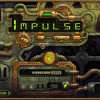Take a look inside 4 images
Impulse
Pros: Solid tutorial, style, and physics engine.
Cons: Tweaky controls and challenging play can dilute physics learning.
Bottom Line: A physics puzzler that accurately models motion but lacks the design polish and fine-tuning necessary to stand out in a crowded field.
Students can hop right into Impulse with no instruction. Let them play through a few stages -- either solo or in pairs -- and then reconvene. Facilitate a discussion on what they observed, and get them to try and describe how the balls behave. What did they observe? What strategies worked? What strategies didn't work? Why? Use this open discussion as a way to start jotting down some key behaviors of the game on a whiteboard/blackboard. The idea should be to get students to extract Newton's laws of motion simply through what they intuited through play. After you've got a good list, introduce students to the actual laws and discuss how the game models them.
Impulse aims to model Newton's laws of motion and does a good job of it. Students use motion, impact, force, and momentum to guide a ball through a level, avoiding enemies and reaching a target. Essentially, it's like an open-top box with a handful of marbles rolling around in it. The student must get one of those marbles to roll to a target without touching the others by managing forces in motion. As levels progress, new types of balls are introduced, increasing the challenge and complexity. Unlike other more patient or deliberate physics games, Impulse is hectic. It's a bit like controlling a car after it has hit an ice patch; there's physics involved, but it's not necessarily the thing that grabs focus. This style of learning can work for some students in short bursts, but sustained play requires determination.
By playing through the game, experimenting with the controls, and devising strategies, students should intuit a basic understanding of Newton's laws. However, since the difficulty ramps up so quickly, students will find themselves pushing a ball through 20 other moving targets. As a result, success is less dependent on physics knowledge and more on-the-fly thinking, luck, and, most important, persistence. Easily discouraged students might be better served by alternatives with more support and engagement that allow for planning, precision, and creativity.










